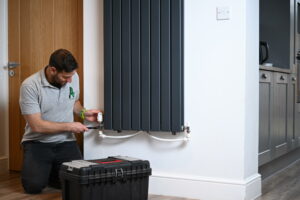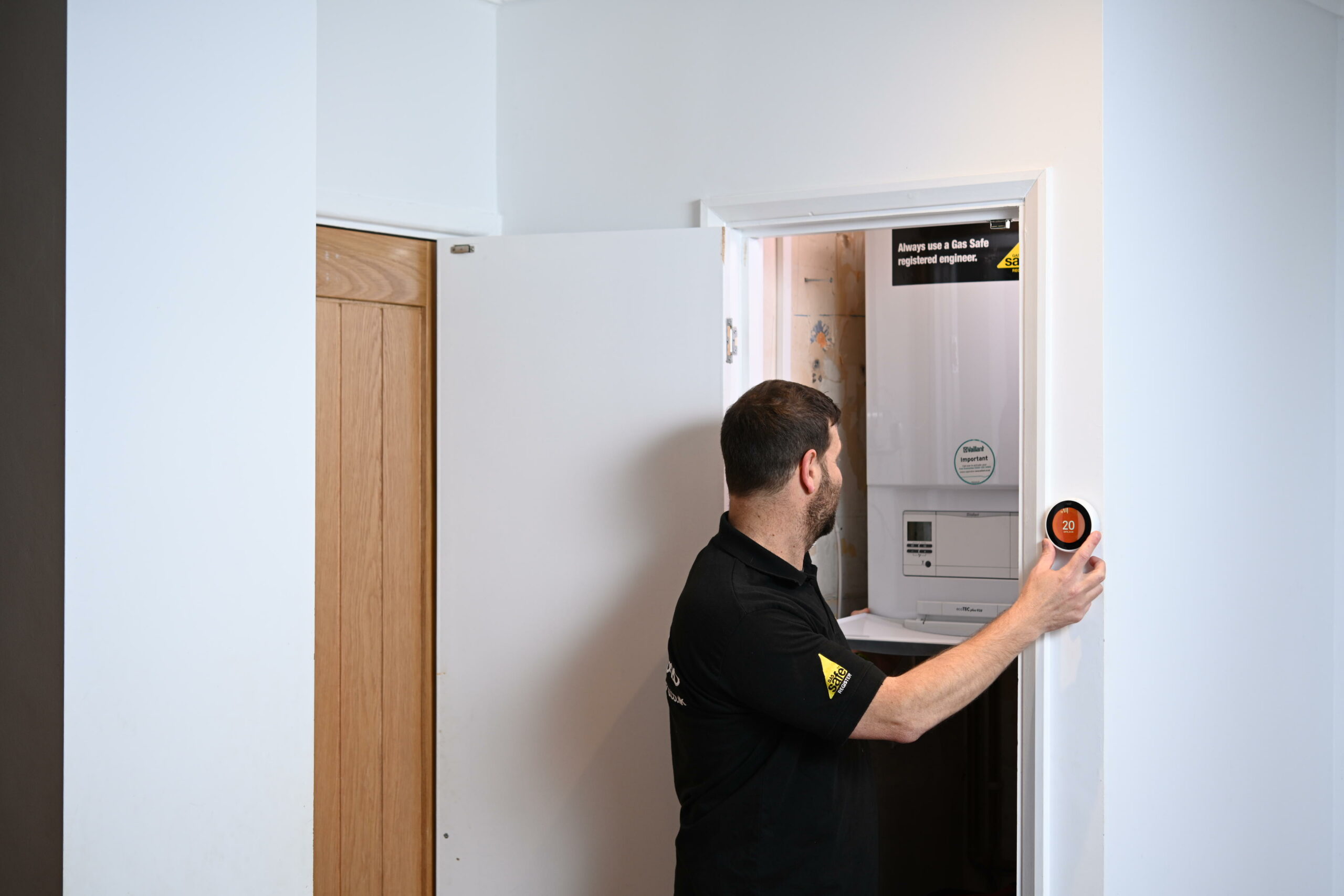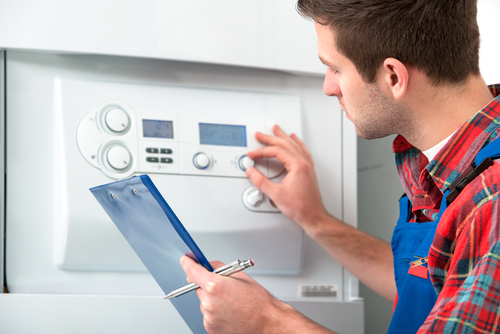Boiler woes can throw a serious spanner in the works of your cosy home life. Getting to grips with boiler troubleshooting tips could save you from chilly nights and steep engineer bills. By diving into this guide, you'll uncover how to keep an eagle eye on your boiler's pressure gauge, crucial for avoiding those dreaded cold showers.
We're also decoding pilot light puzzles, giving you the know-how to switch from old-school flames to savvy electronic ignitions—a key move as boilers evolve. Plus, don't let winter freeze you out; learn what signs scream 'frozen condensate pipe' and how to thaw it without wreaking havoc on your heating.
Last but not least, we'll share some top-notch maintenance advice that keeps breakdowns at bay and prolongs the life of your trusty boiler—because prevention is better than cure when it comes to central heating harmony.
Table of Contents:
- Understanding Your Boiler's Pressure Gauge
- Pilot Lights and Electronic Ignition Systems
- Dealing with a Frozen Condensate Pipe
- Regular Boiler Maintenance Tips
- Conclusion
Understanding Your Boiler's Pressure Gauge
Boiler pressure is the beating heart of your heating system. A wonky gauge can send your boiler into a frenzy.The Role of Water Pressure in Boiler Efficiency
Your combi boiler needs just the right touch of pressure. Too low, and it's slacking off; too high, and it's stressing out. Ideal water pressure? It’s one bar – think Goldilocks.How to Check and Interpret Your Boiler's Pressure Gauge
Finding your boiler's pressure gauge? Look on the control panel. A reading below one bar means "Wake up. I'm thirsty for more.". If it’s creeping over two bars, tell it to calm down already.Topping Up Your Boiler Pressure: A Simple Guide
- To start, locate that filling loop under the boiler.
- You’ll want gloves – safety first when playing with hot stuff.
- Gently open both valves - watch as the magic number rises.
- Nailed one bar? Close 'em quick – no more thirst here.
- All done? Pat yourself on the back. You've topped up like a pro.
Pilot Lights and Electronic Ignition Systems
Remember the old boilers with a small flame always lit? That's your pilot light. Modern gas appliances ditched these for electronic ignition systems.Troubleshooting Pilot Light Issues
Got an older boiler on the blink? Check if the pilot light's out. No glow usually means no go. If it’s off, you might just need to relight it to kick things back into action. Sometimes a gust or draft snuffs out your pilot light. Simple fix: Relight it following your boiler manufacturer's instructions carefully. Keep this tip up your sleeve; could save you calling in a pro. A dirty pilot can also be trouble, blocking gas flow. A gentle clean may get things burning bright again. But watch out - meddling with gas is risky business. Call in a Gas Safe registered engineer if unsure.Transitioning from Pilot Lights to Electronic Ignitions
New kid on the block, electronic ignitions have muscled in, making those continuous little flames history in modern boilers and gas appliances alike. Their MO? Spark only when needed – smarter and safer than keeping an open flame 24/7. Plus they’re penny pinchers, saving you some coin on energy bills over time. Made the switch already but facing hiccups with your fancy new system? It could be as easy as hitting reset on that finicky boiler control panel or checking power supply woes before ringing up an expert’s help desk phone line for advice about fixing boilers like yours that are playing hardball—sometimes even needing their internal electronics sorted by someone who knows their stuff inside-out.Dealing with a Frozen Condensate Pipe
Identifying a Frozen Condensate Pipe
No heat? It could be the condensate pipe. When winter bites, these pipes can freeze solid, stopping boilers in their tracks. A telltale sign is a fault code flashing on your boiler's control panel or gurgling sounds from the boiler. This means trouble. Cold weather wreaks havoc on outdoor pipes. If it's icy outside and there’s no hot water inside, suspect your condensate pipe first.Thawing Your Condensate Pipe Safely
Safety first – never use boiling water to thaw pipes. You might crack them and that spells more trouble than you started with. Lukewarm wins the race here. Gently pour it over the frozen section or wrap a hot water bottle around it for gradual melting action. If patience isn’t your virtue, try using a microwaveable heating pack instead of pouring anything at all - less mess, same effect. To handle this job like a pro without causing damage to your central heating system, take advice from trusted guides.Regular Boiler Maintenance Tips
Maintaining your central heating boiler isn't just about staying warm. It's a way to avoid those frosty morning surprises.Scheduling Annual Check-Ups with a Heating Engineer
Think of it like an MOT for your car, but for your boiler. A Gas Safe registered engineer knows their stuff when it comes to keeping things ticking over smoothly. They'll spot issues before they turn into full-blown problems. An annual visit can save you money in the long run and keep that cosy feeling at home uninterrupted. Trust me; having hot water on tap is better than reaching for the water bottle when you least expect it. The expert eye will fine-tune performance, tweak settings and give peace of mind knowing everything’s safe from carbon monoxide leaks or other hazards. Remember, safety first.Tackling Common Boiler Issues Yourself
Faced with a fault code? Before calling out an engineer, check the manual—sometimes resetting the system does wonders. If there are gurgling sounds or trapped air making radiators less effective, bleed them—it's simpler than boiling water. All you need is a key and some patience; this lets any trapped air escape and restores efficiency. No heat? Don’t panic yet—check if there’s power supply trouble or if thermostat settings got nudged by accident. Sometimes flipping switches back on gets things running again without fuss—or bills.Keeping An Eye On The Pressure Gauge
Your pressure gauge whispers secrets about how well your combi boiler functions: too low means trouble brewing under the hood—a quick top-up might be all that’s needed using that handy filling loop underneath. If we're talking stats though—the magic number here is one bar minimum pressure level for smooth sailing (or should I say heating). A regular glance helps catch dips early so you can act fast rather than wait until cold showers force action—that’s not anyone's idea of fun.Pilot Lights And Ignition Systems – Know Your Type
Owning an older model? Then pilot lights may still hold sway in sparking up warmth within your abode—but beware as these little flames can go out leaving rooms chilly without notice. Relighting according to instruction manual steps usually sorts this but sometimes parts wear down signalling time for more technical help. Newer models favour electronic ignition systems—less hassle fewer relights needed ensuring continuous comfort throughout seasons. If you're ever unsure about your boiler or if a problem pops up, don't think twice—get in touch with your gas supplier right away. They'll give you the safe, professional advice and help that's just right for your specific model and make.
Key Takeaway:
Boiler maintenance is like a car MOT; regular check-ups prevent big issues. A pro engineer can spot and fix small problems early, saving you cash and keeping your home cosy. Tackle simple faults yourself by checking manuals and bleeding radiators to keep things running smoothly.






